- Home
- E. F. Benson
The Complete Mapp & Lucia Page 3
The Complete Mapp & Lucia Read online
Page 3
When fully pieced together it was certainly enough to rivet her whole attention, and make her leave unopened the rest of the correspondence, for such a prelude to adventure had seldom sounded in Riseholme. It appeared, even as her husband had told her at lunch, that Mrs Quantock found her cold too obstinate for all the precepts of Mrs Eddy; the True Statement of Being, however often repeated, only seemed to inflame it further, and one day, when confined to the house, she had taken a book “quite at random” from the shelves in her library, under, she supposed, the influence of some interior compulsion. This then was clearly a “leading.”
Mrs Lucas paused a moment as she pieced together these first sentences. She seemed to remember that Mrs Quantock had experienced a similar leading when first she took up Christian Science. It was a leading from the sight of a new church off Sloane Street that day; Mrs Quantock had entered (she scarcely knew why) and had found herself in a Testimony Meeting, where witness after witness declared the miraculous healings they had experienced. One had had a cough, another cancer, another a fractured bone, but all had been cured by the blessed truths conveyed in the Gospel according to Mrs Eddy. However, her memories on this subject were not to the point now; she burned to arrive at the story of the new leading.
Well, the book that Mrs Quantock had taken down in obedience to the last leading proved to be a little handbook of Oriental Philosophies, and it opened, “all of its own accord,” at a chapter called Yoga. Instantly she perceived, as by the unclosing of an inward eye, that Yoga was what she wanted and she instantly wrote to the address from which this book was issued asking for any guidance on the subject. She had read in “Oriental Philosophies” that for the successful practice of Yoga, it was necessary to have a teacher, and did they know of any teacher who could give her instruction? A wonderful answer came to that, for two days afterwards her maid came to her and said that an Indian gentleman would like to see her. He was ushered in, and with a profound obeisance said: “Beloved lady, I am the teacher you asked for; I am your Guru. Peace be to this house! Om!”
Mrs Lucas had by this time got her view of Mrs Quantock’s letter into perfect focus, and she read on without missing a word. “Is it not wonderful, dearest Lucia,” it ran, “that my desire for light should have been so instantly answered? And yet my Guru tells me that it always happens so. I was sent to him, and he was sent to me, just like that! He had been expecting some call when my letter asking for guidance came, and he started at once because he knew he was sent. Fancy! I don’t even know his name, and his religion forbids him to tell it me. He is just my Guru, my guide, and he is going to be with me as long as he knows I need him to show me the True Path. He has the spare bedroom and the little room adjoining where he meditates and does Postures and Pranyama which is breathing. If you persevere in them under instruction, you have perfect health and youth, and my cold is gone already. He is a Brahmin of the very highest caste, indeed caste means nothing to him any longer, just as a Baronet and an Honourable must seem about the same thing to the King. He comes from Benares where he used to meditate all day by the Ganges, and I can see for myself that he is a person of the most extraordinary sanctity. But he can meditate just as well in my little room, for he says he was never in any house that had such a wonderful atmosphere. He has no money at all which is so beautiful of him, and looked so pained and disappointed when I asked him if I might not give him some. He doesn’t even know how he got here from London; he doesn’t think he came by train, so perhaps he was wafted here in some astral manner. He looked so bewildered too when I said the word ‘money,’ and evidently he had to think what it was, because it is so long since it has meant anything to him. So if he wants anything, I have told him to go into any shop and ask that it shall be put down to me. He has often been without food or sleep for days together when he is meditating. Just think!
“Shall I bring him to see you, or will you come here? He wants to meet you, because he feels you have a beautiful soul and may help him in that way, as well as his helping you. I am helping him too he says, which seems more wonderful than I can believe. Send me a line as soon as you get back. Tante salute!
“Your own, “DAISY.”
The voluminous sheets had taken long in reading and Mrs Lucas folded them up slowly and thoughtfully. She felt that she had to make a swift decision that called into play all her mental powers. On the one hand it was “up to her” to return a frigid reply, conveying, without making any bones about the matter, that she had no interest in nameless Gurus who might or might not be Brahmins from Benares and presented themselves at Daisy’s doors in a penniless condition without clear knowledge whether they had come by train or not. In favour of such prudent measures was the truly Athenian character of Daisy’s mind, for she was always enquiring into “some new thing,” which was the secret of life when first discovered, and got speedily relegated to the dust-heap. But against such a course was the undoubted fact that Daisy did occasionally get hold of somebody who subsequently proved to be of interest, and Lucia would never forget to her dying day the advent in Riseholme of a little Welsh attorney, in whom Daisy had discovered a wonderful mentality. Lucia had refused to extend her queenly hospitality to him, or to recognise his existence in any way during the fortnight when he stayed with Daisy, and she was naturally very much annoyed to find him in a prominent position in the Government not many years later. Indeed she had snubbed him so markedly on his first appearance at Riseholme that he had refused on subsequent visits to come to her house at all, though he several times visited Mrs Quantock again, and told her all sorts of political secrets (so she said) which she would not divulge for anything in the world. There must never be a repetition of so fatal an error.
Another thing inclined the wavering balance. She distinctly wanted some fresh element at her court, that should make Riseholme know that she was in residence again. August would soon be here with its languors and absence of stimulus, when it was really rather difficult in the drowsy windless weather to keep the flag of culture flying strongly from her own palace. The Guru had already said that he felt sure she had a beautiful soul, and— The outline of the scheme flashed upon her. She would have Yoga evenings in the hot August weather, at which, as the heat of the day abated, graceful groups should assemble among the mottos in the garden and listen to high talk on spiritual subjects. They would adjourn to delicious moonlit suppers in the pergola, or if the moon was indisposed—she could not be expected to regulate the affairs of the moon as well as of Riseholme—there would be dim seances and sandwiches In the smoking-parlour. The humorous furniture should be put in cupboards, and as they drifted towards the front hall again, when the clocks struck an unexpectedly late hour, little whispered colloquies of “How wonderful he was tonight” would be heard, and there would be faraway looks and sighs, and the notings down of the titles of books that conducted the pilgrim on the Way. Perhaps as they softly assembled for departure, a little music would be suggested to round off the evening, and she saw herself putting down the soft pedal as people rustled into their places, for the first movement of the “Moonlight Sonata.” Then at the end there would be silence, and she would get up with a sigh, and someone would say “Lucia mia”! and somebody else “Heavenly Music,” and perhaps the Guru would say “Beloved lady,” as he had apparently said to poor Daisy Quantock. Flowers, music, addresses from the Guru, soft partings, sense of refreshment…. With the memory of the Welsh attorney in her mind, it seemed clearly wiser to annex rather than to repudiate the Guru. She seized a pen and drew a pile of postcards towards her, on the top of which was printed her name and address.
“Too wonderful,” she wrote, “pray bring him yourself to my little garden-party on Friday. There will be only a few. Let me know if he wants a quiet room ready for him.”
All this had taken time, and she had but scribbled a dozen postcards to friends bidding them come to her garden party on Friday, when tea was announced. These invitations had the mystic word “Hightum” written at the bottom lef
t hand corner, which conveyed to the enlightened recipient what sort of party it was to be, and denoted the standard of dress. For one of Lucia’s quaint ideas was to divide dresses into three classes, “Hightum,” “Tightum” and “Scrub.” “Hightum” was your very best dress, the smartest and newest of all, and when “Hightum” was written on a card of invitation, it implied that the party was a very resplendent one. “Tightum” similarly indicated a moderately smart party, “Scrub” carried its own significance on the surface. These terms applied to men’s dress as well and as regards evening parties: a dinner party “Hightum” would indicate a white tie and a tail coat; a dinner party “Tightum” a black tie and a short coat, and a dinner “Scrub” would mean morning clothes.
With tea was announced also the advent of Georgie Pillson who was her gentleman-in-waiting when she was at home, and her watch-dog when she was not. In order to save subsequent disappointment, it may be at once stated that there never has been, was, or ever would be the smallest approach to a flirtation between them. Neither of them, she with her forty respectable years and he with his blameless forty-five years, had ever flirted, with anybody at all. But it was one of the polite and pleasant fictions of Riseholme that Georgie was passionately attached to her and that it was for her sake that he had settled in Riseholme now some seven years ago, and that for her sake he remained still unmarried. She never, to do her justice, had affirmed anything of the sort, but it is a fact that sometimes when Georgie’s name came up in conversation, her eyes wore that “faraway” look that only the masterpieces of art could otherwise call up, and she would sigh and murmur “Dear Georgie”! and change the subject, with the tact that characterized her. In fact their mutual relations were among the most Beautiful Things of Riseholme, and hardly less beautiful was Peppino’s attitude towards it all. That large hearted man trusted them both, and his trust was perfectly justified. Georgie was in and out of the house all day, chiefly in; and not only did scandal never rear its hissing head, but it positively had not a head to hiss with, or a foot to stand on. On his side again Georgie had never said that he was in love with her (nor would it have been true if he had), but by his complete silence on the subject coupled with his constancy he seemed to admit the truth of this bloodless idyll. They talked and walked and read the masterpieces of literature and played duets on the piano together. Sometimes (for he was the more brilliant performer, though as he said “terribly lazy about practising,” for which she scolded him) he would gently slap the back of her hand, if she played a wrong note, and say “Naughty!” And she would reply in baby language “Me vewy sowwy! Oo naughty too to hurt Lucia!” That was the utmost extent of their carnal familiarities, and with bright eyes fixed on the music they would break into peals of girlish laughter, until the beauty of the music sobered them again.
Georgie (he was Georgie or Mr Georgie, never Pillson to the whole of Riseholme) was not an obtrusively masculine sort of person. Such masculinity as he was possessed of was boyish rather than adult, and the most important ingredients in his nature were womanish. He had, in common with the rest of Riseholme, strong artistic tastes, and in addition to playing the piano, made charming little water-colour sketches, many of which he framed at his own expense and gave to friends, with slightly sentimental titles, neatly printed in gilt letters on the mount. “Golden Autumn Woodland,” “Bleak December,” “Yellow Daffodils,” “Roses of Summer” were perhaps his most notable series, and these he had given to Lucia, on the occasion of four successive birthdays. He did portraits as well in pastel; these were of two types, elderly ladies in lace caps with a row of pearls, and boys in cricket shirts with their sleeves rolled up. He was not very good at eyes, so his sitters always were looking down, but he was excellent at smiles, and the old ladies smiled patiently and sweetly, and the boys gaily. But his finest accomplishment was needlework and his house was full of the creations of his needle, wool-work curtains, petit-point chair seats, and silk embroideries framed and glazed. Next to Lucia he was the hardest worked inhabitant of Riseholme but not being so strong as the Queen, he had often to go away for little rests by the sea-side. Travelling by train fussed him a good deal, for he might not be able to get a corner seat, or somebody with a pipe or a baby might get into his carriage, or the porter might be rough with his luggage, so he always went in his car to some neighbouring watering-place where they knew him. Dicky, his handsome young chauffeur, drove him, and by Dicky’s side sat Foljambe, his very pretty parlour-maid who valetted him. If Dicky took the wrong turn his master called “Naughty boy” through the tube, and Foljambe smiled respectfully. For the month of August, his two plain strapping sisters (Hermione and Ursula alas!) always came to stay with him. They liked pigs and dogs and otter-hunting and mutton-chops, and were rather a discordant element in Riseholme. But Georgie had a kind heart, and never even debated whether he should ask Hermy and Ursy or not, though he had to do a great deal of tidying up after they had gone.
There was always a playful touch between the meetings of these two when either of them had been away from Riseholme that very prettily concealed the depth of Georgie’s supposed devotion, and when she came out into the garden where her Cavalier and her husband were waiting for their tea under the pergola, Georgie jumped up very nimbly and took a few chassee-ing steps towards her with both hands outstretched in welcome. She caught at his humour, made him a curtsey, and next moment they were treading a little improvised minuet together with hands held high, and pointed toes. Georgie had very small feet, and it was a really elegant toe that he pointed, encased in cloth-topped boots. He had on a suit of fresh white flannels and over his shoulders, for fear of the evening air being chilly after this hot day, he had a little cape of a military cut, like those in which young ladies at music-halls enact the part of colonels. He had a straw-hat on, with a blue riband, a pink shirt and a red tie, rather loose and billowy. His face was pink and round, with blue eyes, a short nose and very red lips. An almost complete absence of eyebrow was made up for by a firm little brown moustache clipped very short, and brushed upwards at its extremities. Contrary to expectation he was quite tall and fitted very neatly into his clothes.
The dance came to an end with a low curtsey on Lucia’s part, an obeisance hat in hand from Georgie (this exposure shewing a crop of hair grown on one side of his head and brushed smoothly over the top until it joined the hair on the other side) and a clapping of the hands from Peppino.
“Bravo, bravo,” he cried from the tea-table. “Capital!”
Mrs Lucas blew him a kiss in acknowledgment of this compliment and smiled on her partner. “Amico!” she said. “It is nice to see you again. How goes it?”
“Va bene,” said Georgie to show he could talk Italian too. “Va very bene now that you’ve come back.”
“Grazie! Now tell us all the news. We’ll have a good gossip.”
Georgie’s face beamed with a “solemn gladness” at the word, like a drunkard’s when brandy is mentioned.
“Where shall we begin?” he said. “Such a lot to tell you. I think we must begin with a great bit of news. Something really mysterious.”
Lucia smiled inwardly. She felt that she knew for dead certain what the mysterious news was, and also that she knew far more about it than Georgie. This superiority she completely concealed. Nobody could have guessed it.
“Presto, presto!” she said. “You excite me.”
“Yesterday morning I was in Rush’s,” said Georgie, “seeing about some Creme de menthe, which ought to have been sent the day before. Rush is very negligent sometimes—and I was just saying a sharp word about it, when suddenly I saw that Rush was not attending at all, but was looking at something behind my back, and so I looked round. Guess!”
“Don’t be tantalising, amico,” said she. “How can I guess? A pink elephant with blue spots!”
“No, guess again!”
“A red Indian in full war paint.”
“Certainly not! Guess again,” said Georgie, with a little sigh of relief.
(It would have been awful if she had guessed.) At this moment Peppino suddenly became aware that Lucia had guessed and was up to some game.
“Give me your hand, Georgie,” she said, “and look at me. I’m going to read your thoughts. Think of what you saw when you turned round.”
She took his hand and pressed it to her forehead, closing her eyes.
“But I do seem to see an Indian,” she said. “Ah, not red Indian, other Indian. And—and he has slippers on and brown stockings—no, not brown stockings; it’s legs. And there’s a beard, and a turban.”
She gave a sigh.
“That’s all I can see,” she said.
“My dear, you’re marvellous,” said he. “You’re quite right.”
A slight bubbling sound came from Peppino, and Georgie began to suspect.
“I believe you’ve seen him!” he said. “How tarsome you are….”
When they had all laughed a great deal, and Georgie had been assured that Lucia really, word of honour, had no idea what happened next, the narrative was resumed.
“So there stood the Indian, bowing and salaaming most politely and when Rush had promised me he would send my Creme de menthe that very morning, I just looked through a wine list for a moment, and the Indian with quantities more bows came up to the counter and said, ‘If you will have the great goodness to give me a little brandy bottle.’ So Rush gave it him, and instead of paying for it, what do you think he said? Guess.”
Mrs Lucas rose with the air of Lady Macbeth and pointed her finger at Georgie.
“He said ‘Put it down to Mrs Quantock’s account,’” she hissed.
Of course the explanation came now, and Lucia told the two men the contents of Mrs Quantock’s letter. With that her cards were on the table, and though the fact of the Brahmin from Benares was news to Georgie, he had got many interesting things to tell her, for his house adjoined Mrs Quantock’s and there were plenty of things which Mrs Quantock had not mentioned in her letter, so that Georgie was soon in the position of informant again. His windows overlooked Mrs Quantock’s garden, and since he could not keep his eyes shut all day, it followed that the happenings there were quite common property. Indeed that was a general rule in Riseholme: anyone in an adjoining property could say, “What an exciting game of lawn-tennis you had this afternoon!” having followed it from his bedroom. That was part of the charm of Riseholme; it was as if it contained just one happy family with common interests and pursuits. What happened in the house was a more private matter, and Mrs Quantock, for instance, would never look from the rising ground at the end of her garden into Georgie’s dining-room or, if she did she would never tell anyone how many places were laid at table on that particular day when she had asked if he could give her lunch, and he had replied that to his great regret his table was full. But nobody could help seeing into gardens from back windows: the “view” belonged to everybody.

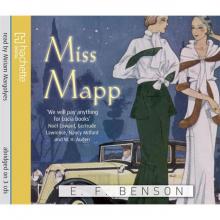 Miss Mapp
Miss Mapp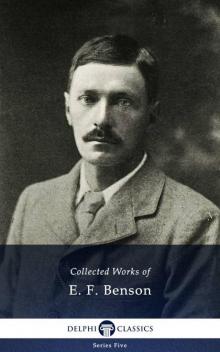 Works of E F Benson
Works of E F Benson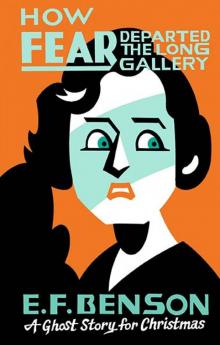 How Fear Departed the Long Gallery
How Fear Departed the Long Gallery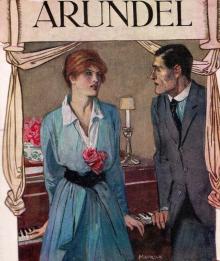 Dodo's Daughter: A Sequel to Dodo
Dodo's Daughter: A Sequel to Dodo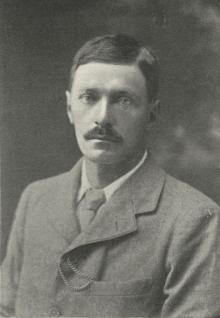 The House of Defence v. 1
The House of Defence v. 1 Queen Lucia
Queen Lucia Night Terrors
Night Terrors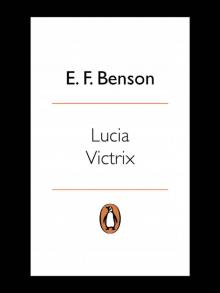 Lucia Victrix
Lucia Victrix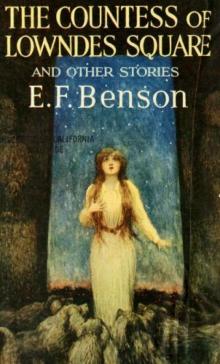 The Countess of Lowndes Square and Other Stories
The Countess of Lowndes Square and Other Stories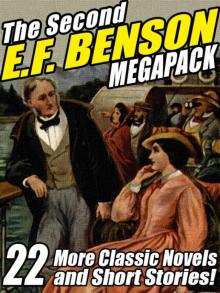 The Second E. F. Benson Megapack
The Second E. F. Benson Megapack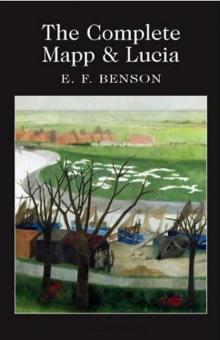 The Complete Mapp & Lucia
The Complete Mapp & Lucia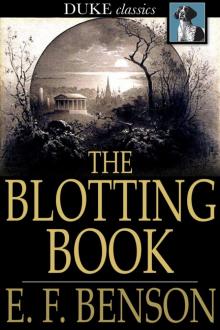 The Blotting Book
The Blotting Book The E. F. Benson Megapack
The E. F. Benson Megapack Lucia Rising
Lucia Rising Ghost Stories
Ghost Stories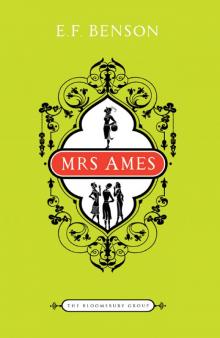 Mrs. Ames
Mrs. Ames E. F. Benson
E. F. Benson